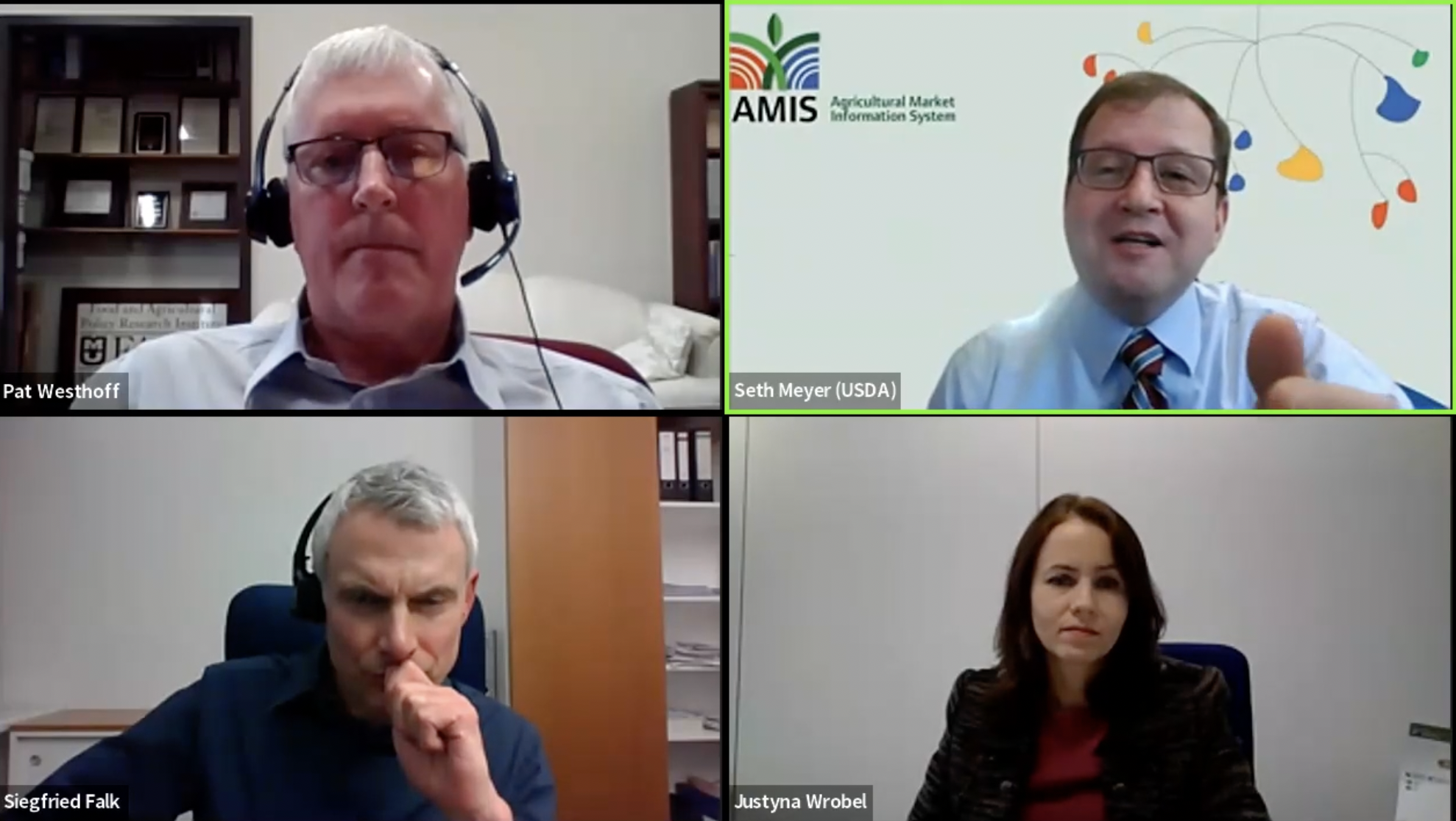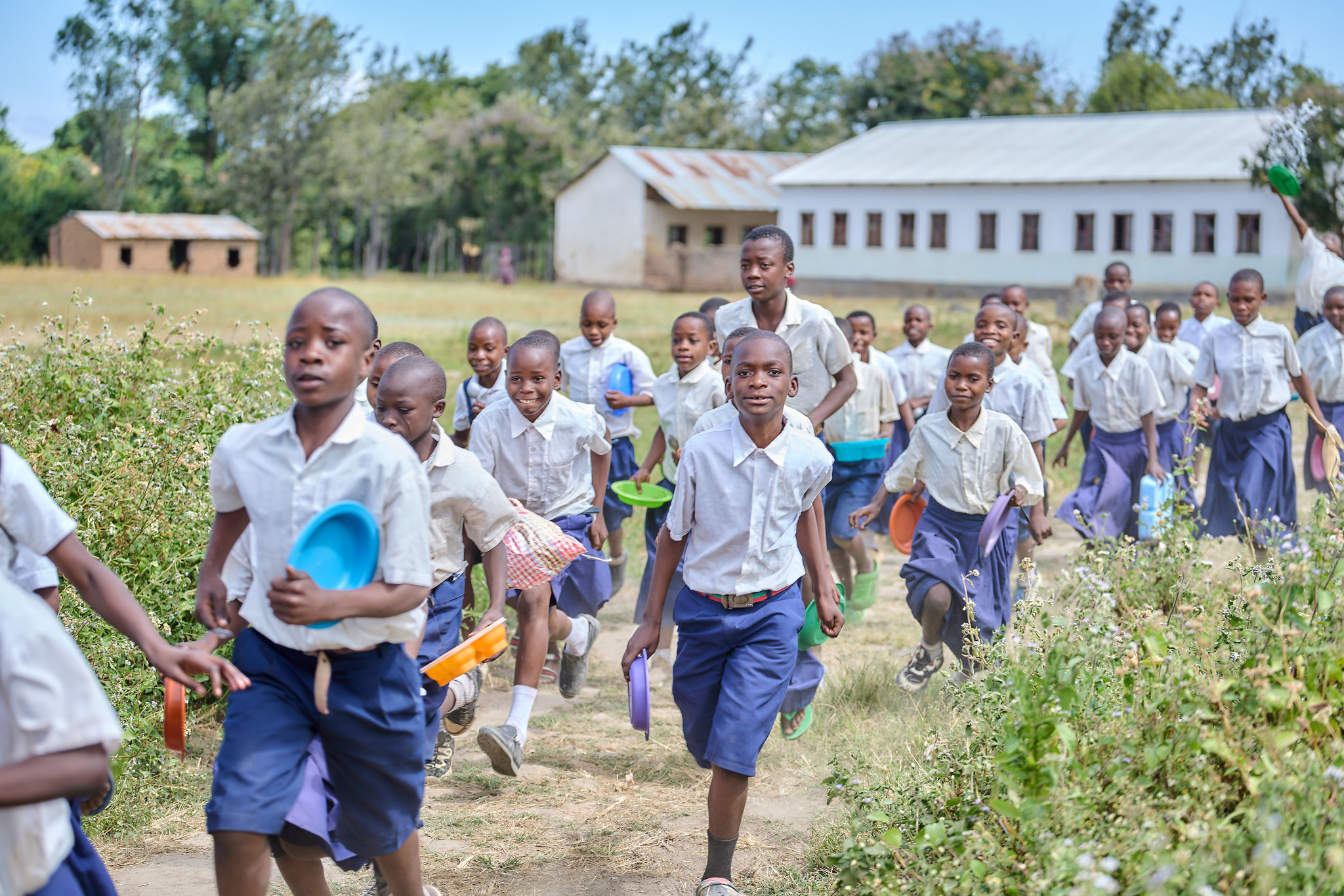Substantial increases in biofuel production were thought to have contributed to the steep food price spikes witnessed in 2007-08. Now, with global food prices down from recent peaks but still high, the “food vs. fuel” question—the issue of how biofuel production affects food supplies and food price inflation—is being revisited.
To explore this important question, IFPRI and the Agricultural Market Information System (AMIS) co-sponsored a January 24 discussion by market analysts and experts. The policy seminar, led by USDA Chief Economist Seth Meyer and IFPRI Senior Research Fellow Joe Glauber (who serve as AMIS Chair and Secretary, respectively), looked at current global biofuel trends and projections to examine the food vs. fuel question during the current period of food price inflation concerns.
Key takeaways from the discussion:
- Projections through 2031 by the Organisation for Economic Co-operation and Development (OECD) and the UN Food and Agriculture Organization (FAO) show an increase in biofuel production, albeit not as large as that seen in earlier years, with much of the growth occurring in Asia. Several factors, however, could shape future trends and lead to an over- or undershooting of the OECD-FAO projections.
- Biofuel production still relies heavily on food crops and vegetable oil, with limited growth of alternative feedstocks.
- Considering that biofuel production is still largely driven by policies (mandates), speakers agreed on the importance of flexibility, or “off-ramps,” to mitigate negative impacts on food affordability.
Biofuel trends, projections, and things to watch for
As outlined by LeeAnn Jackson, Head of the OECD Agro-food Trade and Markets Division, the OECD-FAO Agricultural Outlook 2022-2031 projects global ethanol production of 140 billion liters by 2031, which is not a huge increase from today’s levels, and mainly driven by expected expansion in Asia. For biodiesel, the outlook projects production of 55 billion liters by 2031, with expected increases also occurring in Asia, foremost in Indonesia.
Figures 1-2
Past growth in ethanol production was primarily driven by the United States and Brazil, but more recent and projected growth by India. Past growth in biodiesel production was primarily driven by the European Union, but more recent and projected growth is driven by Indonesia, the U.S., and Brazil.
Factors which could drive production above these projections include the possible large-scale development of sustainable aviation fuels, and further increases in hydrotreated vegetable oils (HVOs) as a diesel substitute. Production could fall below projections, however, with a larger-than-anticipated expansion of electric vehicle manufacturing and sales. Higher or lower mandates could also lead to deviations from these projections.
Figure 3
Siegfried Falk, Co-editor of Oil World, noting that the vegetable oil prices had decreased from their 2022 spikes, and that 2023 may see a five-year peak in production growth, said he expects that the “massive” demand for oilseeds (vegetable oils and animal fats) for food and fuels (up by 10 million tons during 2021-22 can be managed this year, but may prove to be problematic moving forward. Moreover, Indonesia did not alter its biodiesel mandate in 2022 requiring a 30% mix in fuels, but may raise it to 35% in 2023, which would likely result in a decrease of palm oil exports. Indonesian palm oil exports constitute a third of global vegetable oil trade. Falk also pointed to aging oil palms as a constraint on the supply side in both Indonesia and Malaysia, as well as labor shortages in Malaysia.
Marcelo Fernandes Guimarães, General Coordinator of Studies and Information, Brazil Ministry of Agriculture, Livestock and Food Supply, and Brazil’s delegate to AMIS, said he was optimistic about Brazil’s ability to expand biofuel production, given that historically it has not jeopardized food production or exports. A large projected increase in the planting of maize for ethanol and soybeans for biodiesel, along with continuing high exports to China and elsewhere, can be accommodated by the impressive cultivation potential in the Center-West region of Brazil.
Biofuel feedstocks
Past projections about the swift uptake of alternative feedstocks in biofuel production have by and large not materialized and are not projected to increase dramatically. Ethanol is still largely derived from maize and sugarcane. Biodiesel, despite some growth in the use of waste oils and tallow as feedstocks (speakers noted the EU has increased the use of waste oils and reduced palm oil imports), is still largely based on palm, soybeans, and rapeseed. Food crops still make up the bulk of feedstocks for biofuel production, including maize, vegetable oil, sugarcane and molasses. However, Jackson observed, a much greater percentage of global maize production goes into animal feed than into ethanol production.
Emphasis on flexible policies
Justyna Wrobel, Team Leader, DG AGRI, European Commission and the EU Delegate to AMIS, explained that the EU has built flexibility into its biofuels policy, which allows for adjustments in times of high food price inflation: In 2022 EU member states were authorized to reduce the EU cap on biofuel production from traditional feedstocks in light of the decrease of sunflower oil imports from Ukraine, to slow down the substitution of rapeseed for biodiesel production.
Pat Westhoff, Director, University of Missouri Food and Agricultural Policy Research Institute, said that the U.S. Environmental Protection Agency (EPA), which writes rules on an annual basis to implement the U.S. Renewable Fuel Standard (RFS), has some discretion, but that further flexibility might be advisable in order to ensure that the RFS does not create an inelastic ethanol demand, which can exacerbate price trends.
Brazil, explained Guimarães, lowered its mandate on the percentage of biodiesel that must be blended with diesel from 13% to 10% in 2022. The new Brazilian government is presently debating a possible increase to 15%, with a decision to be taken in March of this year.
All speakers emphasized the importance of flexibility as governments set their biofuel policies and mandates going forward, to ensure that production targets can be adjusted during times of market difficulties and supply-demand imbalances.
Charlotte Hebebrand is IFPRI's Director of Communications and Public Affairs.







